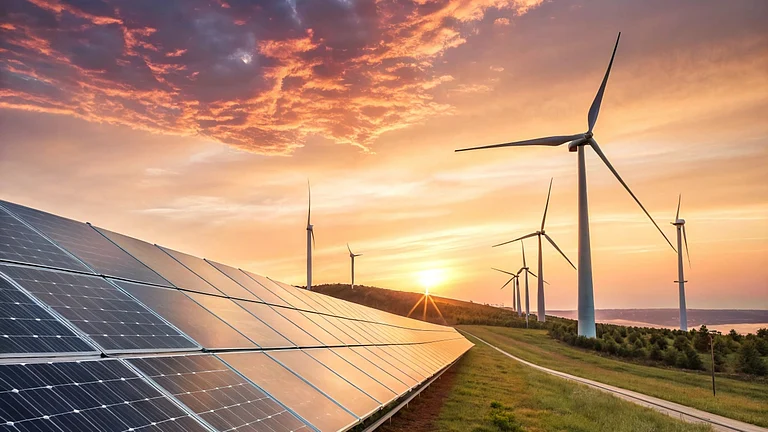India’s Union Budget 2025 signals an unwavering commitment to sustainable economic growth, with clean energy, industrial decarbonisation and green manufacturing placed at the forefront. In line with its Paris Agreement commitments, the budget sets ambitious short-term goals for 2030 and a long-term vision for net-zero emissions by 2070, reinforcing the government’s focus on climate resilience and sustainable growth. For the green business ecosystem, particularly carbon credit developers and sustainability service providers, the budget holds tremendous promise but also highlights a gap in support for carbon markets, which is a crucial mechanism to accelerate India's decarbonisation.
As the world grapples with the urgent need to mitigate climate change, carbon pricing mechanisms and market-driven decarbonisation efforts will become increasingly important. India, being the world’s third-largest emitter, must integrate these mechanisms robustly into its economic structure. While the budget provides a solid foundation for renewable energy, clean tech manufacturing and grid infrastructure, the absence of specific budget allocations for carbon markets means that vital financial tools to drive emission reductions could be left underdeveloped.
The Good News
At the core of the 2025 budget’s climate strategy is the expansion of clean energy and the acceleration of industrial decarbonisation. With substantial investments in renewable energy, clean technology manufacturing and electric vehicle (EV) infrastructure, India is aligning itself with global efforts to tackle climate change. The introduction of the Small Modular Reactor (SMR) programme and incentives for solar, wind and storage technologies mark significant milestones in India’s energy transition.
For instance, the government’s plan to support domestic production of solar PV [photovoltaic] cells, EV batteries, wind turbines and grid-scale storage solutions will help build a self-reliant clean energy ecosystem, reducing reliance on imported technologies and contributing to sustainable economic growth. The focus on grid modernisation will ensure that renewable energy can be integrated effectively, addressing issues related to intermittency and grid stability.
Such initiatives will undoubtedly help reduce India’s carbon footprint, making the country a leader in clean energy technology innovation. However, for these initiatives to reach their full potential, the establishment of a robust carbon market is essential, where industries can engage in emission reduction projects and buy or sell carbon credits to meet regulatory requirements. Without a clear framework supporting carbon trading, these efforts may not achieve their maximum impact in driving large-scale emissions reductions.
But Policy Gaps Remain
India’s current climate finance mechanisms are primarily focused on renewable energy and energy efficiency, but carbon markets have the potential to drive substantial decarbonisation across industries. In the context of the Paris Agreement, carbon markets are instrumental in creating a cost-effective pathway for countries to meet their NDCs [nationally determined contributions]. By allowing industries to offset emissions through projects that reduce carbon, such as renewable energy or afforestation initiatives, carbon markets provide financial incentives for businesses to invest in emission-reducing technologies.
Although the budget outlines measures to support clean tech manufacturing and industrial decarbonisation, it does not include direct financial support or a structured policy for expanding carbon markets in India.
This gap in policy leaves a crucial mechanism underutilised. The absence of clear regulatory support and incentives for carbon markets could hinder India’s ability to build a scalable, efficient carbon trading infrastructure that supports businesses in their decarbonisation efforts.
Carbon markets are a key enabler for companies to achieve their net-zero goals, while also providing a platform for monetising emission reductions. This would help businesses transition more quickly to low-carbon operations by creating a clear financial framework to support carbon credit trading, thereby making emission reductions both economically attractive and commercially viable.
Need for Financial Support
While India has made progress in launching pilot carbon trading programmes, there remains a lack of comprehensive policy to expand the carbon market ecosystem. As the government pushes for climate resilience, it must recognise the importance of enabling financial mechanisms that allow businesses to monetise their sustainability initiatives. This includes carbon credit markets that can act as a key driver of low-carbon investments.
For businesses to scale up their decarbonisation efforts, they need a supportive financial ecosystem that not only rewards emission reductions but also provides greater liquidity and transparency in the carbon credit market. With global carbon markets evolving rapidly, India must also ensure its framework aligns with international best practices and facilitates cross-border carbon credit trading. This will help Indian companies access global carbon markets and attract foreign investment in sustainability projects.
For the carbon markets to function effectively, there must be a focus on building trust, transparency and scalability. This requires policy interventions that provide financial backing and regulatory clarity for businesses and investors.
The creation of an Indian carbon exchange, along with a national carbon pricing mechanism, could catalyse a wave of green investments while helping Indian industries meet international emission reduction targets.
Sectoral Opportunities
A potential gap in the budget is the lack of explicit reference to specific support for carbon credits in key sectors. As industries across the globe begin to set their own net-zero targets, sectors such as aviation, shipping and manufacturing will increasingly look to carbon markets as a means of meeting emission reduction obligations.
The UDAN regional connectivity scheme, which will expand aviation routes to 120 new destinations, is one such area that could benefit from a clear carbon offset framework. The aviation industry could then foster demand for carbon credits from sustainable projects, such as renewable energy development and reforestation, thereby driving further decarbonisation in the aviation and energy sectors.
In the shipping industry too, the revamped financial assistance policy that includes ship recycling in Indian yards offers a unique opportunity to promote circular economy principles. By linking these initiatives to carbon markets, businesses engaged in shipbuilding and recycling could participate in carbon credit generation through waste-to-energy projects, creating a sustainable maritime sector that benefits both the environment and the economy.
This interim budget is a strong step forward in supporting renewable energy, clean technology manufacturing and industrial decarbonisation. However, for the budget’s climate ambitions to be fully realised, the government must recognise the importance of carbon markets in accelerating the nation’s net-zero transition.
We urge policymakers to prioritise carbon market infrastructure and offer specific budget allocations to support the growth and scalability of carbon markets. India has the potential for accelerated emission reductions, attracting green investment and creating a robust market for carbon credits.
With a clear carbon market policy, India will be better positioned to achieve its NDC targets, contribute to global climate action under the Paris Agreement and meet its long-term net-zero goal for 2070. By aligning the budget with strategic carbon market incentives, India can take a leading role in the global transition to a low-carbon economy, driving both economic growth and climate resilience.
The author is chairman and managing director, EKI Energy Services and president, Carbon Markets Association of India. Views are personal.


























